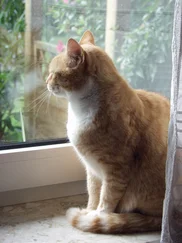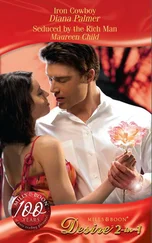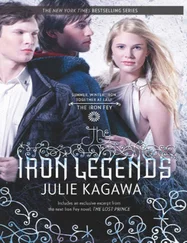A silence fell in which I clearly heard the tinkle of breaking glass. 'Wait!' I called, and ran, truly ran – I did not know I had it in me – to the kitchen door. 'Wait!' I called, slapping at the pane, fumbling with the bolts and chains – 'Don't do anything!'
There was someone in a blue overcoat standing on the veranda with his back to me. Though he must have heard me, he did not turn.
I drew the last bolt, flung the door open, appeared among them. I had forgotten my gown, my feet were bare, I stood there in my white nightdress like, for all I know, a body risen from the dead. 'Wait!' I said. 'Don't do anything yet, he is just a child!'
There were three of them. Two were in uniform. The third, wearing a pullover with reindeer running in a band across his chest, held a pistol pointing downward. 'Give me a chance to talk to him,' I said, splashing through the night's puddles. They stared in astonishment but did not try to stop me.
The window of Florence 's room was shattered. The room itself was in darkness; but, peering through the hole, I could make out a figure crouched beside the bed at the far end.
'Open the door, my boy,' I said. 'I won't let them hurt you, I promise.'
It was a lie. He was lost, I had no power to save him. Yet something went out from me to 'him. I ached to embrace him, to protect him.
One of the policemen appeared beside me, pressed against the wall. 'Tell him to come out,' he said. I turned on him in a fury. 'Go away!' I screamed, and fell into a fit of coughing.
The sun was coming up, rosy, in a sky full of drifting cloud.
'John!' I called through the coughing. 'Come out! I will not let them do anything to you.'
Now the man in the pullover was at my side. 'Tell him to pass out his weapons,' he said in a low voice.
'What weapons?'
'He has a pistol, I don't know what else. Tell him to pass everything out.'
'First promise you will not hurt him.'
His fingers closed on my arm. I resisted, but he was too strong. 'You are going to catch pneumonia out here,' he said. Something descended on me from behind: a coat, an overcoat, one of the policemen's overcoats. 'Neem haar binne,' he murmured. They guided me back to the kitchen and closed the door on me.
I sat down, stood up again. The coat stank of cigarette smoke. I dropped it on the floor and opened the door. My feet were blue with cold. 'John!' I called. The three men were huddled over a radio. The one who had given me his coat turned with an exasperated air. 'Lady, it is dangerous out here,' he said. He bundled, me indoors again, then could not find the key to lock the door,
'He is just a child,' I said.
'Let us do our work, lady,' he replied.
'I am watching you,' I said: 'I am watching everything you do. I tell you, he is just a child!'
He drew a breath as though about to respond, then let it out in a sigh and waited for me to talk myself out. A young man, solid, raw-boned. Son to someone, cousin to many. Many cousins, many aunts and uncles, great-aunts and great-uncles, standing about him, behind him, above him like a chorus, guiding, admonishing.
What could I say? What did we have in common to make intercourse possible, except that he was here to defend me, to defend my interests, in the wider sense?
'Ek staan nie aan jou kant nie,' I said. 'Ek staan aan die temkant. ' I stand on the other side. But on the other bank too, the other bank of the river. On the far bank, looking back.
He turned, inspecting the stove, the sink, the racks, occupying die ou dame while his friends did their business outside. All in a day's work.
'That's all,' I said. 'I'm finished. I wasn't talking to you anyway.'
To whom then? To you: always to you. How I live, how I lived: my story.
The doorbell rang. More men, men in boots and caps and camouflage uniforms, tramping through the house. They clustered at the kitchen window. 'Hy sit daar in die buitekamer,' explained the policeman, pointing to Florence 's room, 'Daar's net die een deur en die een venster.'
'Nee, dan het ons horn,' said one of the newcomers.
'I warn you, I'm watching everything you do,' I said.
He turned to me. 'Do you know this boy?' he said.
'Yes, I know him.'
'Did you know he had arms?'
I shrugged. 'God save the unarmed in these days.'
Someone else came in, a young woman in uniform with a crisp, clean air about her. 'Is dit die dame die?' she said; and then, to me: 'We are going to clear the house for a little while, till this business is over. Is there anywhere you, would like to go, friends or relatives?'
'I am not leaving. This is my house.'
Her friendliness, her concern did not waver. 'I know,' she said, 'but it's too dangerous to stay, For just a little while we must ask you to leave.'
The men at the window had stopped talking now: they were impatient for me to be gone. 'Bel die ambulans,' said one of them. 'Ag, sy kan sommer by die stasie wag,' said the woman. She turned to me. 'Come now, Mrs… ' She waited for me to supply the name. I did not. 'A nice warm cup of tea,' she offered.
'I am not going.'
They paid my words no more attention than they would a child's. 'Gaan had 'n kombers,' said the man – ' sy's amper biou pan die koue.'
The woman went upstairs and came back with the quilt from my bed. She wrapped it around me, gave me a hug, then helped me into my slippers, No sign of disgust at my legs, my feet. A good girl, reared to make someone a good wife.
'Are there are any pills or medicines or anything else you want to take along?' she asked.
'I'm not leaving,' I repeated, gripping my chair.
Murmured words passed between her and the men. Without warning I was lifted, from behind, under the arms. The woman took my legs. Like a carpet they carried me to the front door; Pain racked my back. 'Put me down!' I cried,
'In a minute,' said the woman, soothingly,
'I have cancer!' I screamed – 'Put me down!'
Cancer! What a pleasure to fling the word at them! It stopped them in their tracks like a knife. 'Sit haar neer, dalk kom haar iets oor,' said the man holding me – 'Ek het mos gese jy moet die ambulans bel.' Gingerly they laid me down on the sofa.
'Where is the pain?' asked the woman, frowning,
'In my heart,' I said, She looked puzzled. 'I have cancer of the heart.' Then she understood; she shook her head as if shaking off flies.
'Does it pain you to be carried?'
'It pains me all the time,' I said.
She caught the eye of the man behind me; something passed between them so amusing that she could not keep back a smile.
'I caught it by drinking from the cup of bitterness,' I plunged on. What did it matter if they thought me dotty? 'You will probably catch it too one day. It is hard to escape.'
There was a crash of breaking glass. Both of them rushed from the room; I got up and limped behind.
Nothing had changed except that a second windowpane was gone, The courtyard itself was empty; the policemen, half a dozen of them now, were crouching on the veranda, guns at the ready.
'Weg!' shouted one of them furiously, ' Kry haar weg!'
The woman bundled me indoors. As she closed the door there was a curt explosion, a fusillade of shots, then a long stunned silence, then, low talk and, from somewhere, the sound of Vercueil's dog yapping.
I tried to pull open the door, but the woman, held me tight,
'If you have hurt him. I will never forgive you,'1 said.
'It's all right, we'll phone again for the ambulance,' she said, trying to soothe me.
But the ambulance was already there, drawn up on the sidewalk. Scores of people were gathering excitedly from all directions, neighbours, passers-by, young and old, black and white; from the balconies of the flats people stared down. By the tame the policewoman and I emerged from the front door they were wheeling the body, covered in a blanket, down the driveway, and loading it aboard.
Читать дальше












